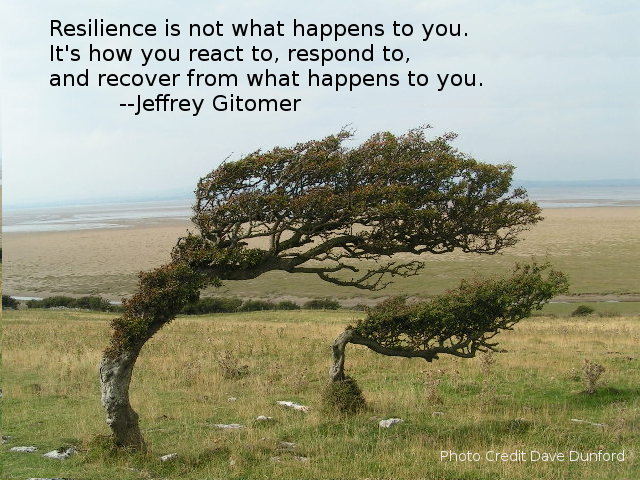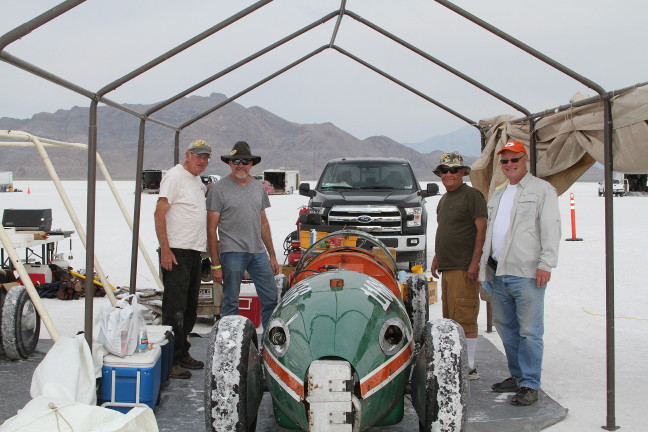Blending Work Lessons Into Your Life

I was going through some papers on my desk and came across a local free paper that I must have picked up while doing some physical therapy at the gym. The cover had a photo of a windblown tree and a quote by Jeffrey Gitomer of “Resilience is not what happens to you. It’s how you react to, respond to, and recover from what happens to you.” This was most likely a reference to the fires that California went through in October of last year and how resilient the people are around here. But it got me thinking of something I learned in sales many years ago and how it has greatly influenced my life.
A long time ago I happened to pick up a flier from a vendor we often worked with. This vendor was smart in that they added more to their fliers than just the information on what they were promoting or selling. There was other value to get you to pick up the ad and also keep it. In this case they had actually put Stephen Covey’s “7 Habits of Highly Effective People” on the sheet as a bullet list in a large font. Of course that list intrigued me, and I probably still have it tucked in a file 23 years later. After getting some CDs of the 7 Habits I discovered Viktor Frankl and his “Man’s Search for Meaning”. Stephen Covey’s key item that lead me to Dr. Frankl was that we can’t control what happens to us, but we can control how we react to it. And that our reaction has more influence on our lives than what actually happened. This is what Frankl felt was “human’s last ultimate freedom.” It is not hard to see how Jeffrey Gitomer was probably influenced by Frankl in making his own quote.
Everything can be taken from a man but one thing: the last of human freedoms – to choose one’s attitude in any given set of circumstances, to choose one’s own way. Viktor E. Frankl
I listened to the CDs multiple times and did my best to apply that lesson to my life. It was humbling to hear of his experiences in the concentration camps of Nazi occupied Poland. Yes, we are impacted by what happens to us. But the greatest impact comes from how we reacted to what happened, and how we choose to respond to that event. Little did I know that a tragedy and the challenges that follow would some day happen upon me. They would give me an opportunity to see how well I could apply this lesson to my own life.
In July I left an exciting job at Fastly to go work for Mattermost in the Messaging, Chat and Collaboration space. I had gotten to see firsthand the amazing value that Slack offered and wanted to get into the MCC realm. With Mattermost I was the first public-facing technical person. The CEO up until that point had been doing most of the Sales Engineering work, supplemented by a handful of developers and a project manager that could jump on calls at times. I was going to build the Sales Engineering team, enhance the docs, build up the process/structure to be scalable/repeatable, do blogging and speak at conferences. It sure looked like a dream job!
Prior to making the switch I had already planned a vacation in August to go to the Bonneville Salt Flats and work on my Land Speed Racing licencing in a friend’s lakester. In the past he had gotten to drive 262mph using a vintage Hemi fueled by nitromethane. I had no aspirations of going that fast running on high-octane gasoline, but was hoping to see 200mph and knew the car could safely do so. So three weeks into my journey at Mattermost I was on the ‘Flats making runs going through the motions to earn a license and be allowed to drive faster as I enjoyed the hobby of Land Speed Racing. (Prior to this experience I had only gone 104mph in a car with a 700cc displacement, but that is more of a Facebook tale than for LinkedIn.)

On the third or forth day out there we were headed out to the pits in the morning to retrieve the car and get in line to go for the next licensing run. Somehow our crew truck was hit head-on by a spectator’s vehicle. The four of us were on BLM land in a recreational manner and had made the mistake of not wearing seat belts. One of my best friends had been sitting beside me and didn’t survive. The other two fellows in the truck suffered injuries such as a broken neck or back. My wife and parents spent weeks at the University of Utah Hospital first waiting to see if I was going to survive, then if I was going to become coherent and regain my memories. Besides a broken leg, traumatic brain injury, a fractured eye socket and broken fingers I didn’t know who or where I was. Fortunately three weeks in it was like a light switch and I recognized my dad sitting in the room with me. I mentally still had recovery to go but was largely there.

Another two weeks was spent in the hospital using either a walker or wheelchair to get to physical and cognitive therapy. I was grateful to be in the condition I was in, but the depth of that gratitude didn’t hit me for a few more days. On multiple occasions there was another specific patient in the therapy room with me. He was in his mid twenties, a good looking fellow, well spoken and I could tell from the tone in his arms he had been in very good shape before whatever accident had happened. While I was learning to “transition” or switch from a chair to the wheelchair or walker, he was learning to operate his wheelchair by blowing into and moving a straw with his mouth. Here I was having been told by my doctor I’d most likely make a full recovery. This poor fellow was looking at a life as a quadriplegic. It really hit me then that I had so much to be grateful for and had to be positive and upbeat in my journey. (I didn’t yet know the fate of my good friend Chris.) Perhaps this fellow comprehended that in so many other countries he wouldn’t be so fortunate as to have the support and technology that he had here. I can’t say for certain what was going through is his mind, but I will always be impressed by his attitude and effort. I was lucky enough to return home a few weeks later and go on disability from work. My recovery near certain, only time and exercise needed.
I brought up Victor Frankl’s teachings in a few conversations with physical therapists, coworkers and doctors over the next few months and knew I would not squander this opportunity to apply that knowledge. I’m not saying I’ve been perfect. I’ve failed on multiple occasions, but overall it has made a tremendous difference in this event. So much was out of my control. But my attitude and reaction was 100% mine to decide.
But the journey and challenges were not over at that point. In October the fires struck Sonoma County. For this county alone, 23 people died and thousands of homes were destroyed. A part of our town was evacuated, and we had friends and family staying with us at various times. Fortunately our home (and those of our parents and siblings) survived. One close friend barely escaped their rural home and only knew where to drive by going where there wasn’t walls of fire. And my son had 6 classmates in his grade that lost their homes. His school also had 6 people that worked there that lost their homes. We’ve gotten to interact with several of those families and their resilience has been so impressive. They’ve lost everything material they had, some even lost beloved pets. Every time we see them they are positive and grateful. It is easy for me to be okay – we didn’t lose anything. But to see someone else lose so much and remain so positive is eye opening.
Then in late December I found out my employer had not been able to wait for me to recover. When I was ready to return to work part-time I was told the job no longer existed and they had no other comparable roles to offer. I can easily rationalize how a small firm needed to keep moving forward. But I was hurt by how the communication was handled as well as frustrated by the prospect of entering the employment game after so many firms had already done their hiring for Q1. I still was wearing an eye patch because of the double vision and wasn’t typing fast yet, hence only being available for part-time work. And I failed here also to apply Frankl’s lesson. The event left me feeling hurt since I had felt something was wrong at work back in early November and had tried to open a dialogue. Because of that experience the anger and frustration was improperly vented at my boss and the CEO. The truth is I don’t know what economic factors they were dealing with, or what bad advice they were perhaps given by the company that handled their benefits. The reality is that I’ve got a diverse skill set, am in a great space and am living in the Bay Area. So I will be fine, but at the time it was hard to see past the anger and frustration.
This all has been so much easier to navigate because of having learned the lessons Viktor Frankl offered up. I couldn’t have avoided being in the car accident. Several friends had no way to save their homes. And it was inevitable that I’d be searching for new work having this long of a recovery period. But all of us have seen how being grateful for what we can and controlling our reaction can make a tremendous difference to our quality of life.
People will say “keep work separate from your home life” but the reality is that things that affect you to the core are hard to keep separate. I urge you to take Vikor Frankl’s words to heart. It is a lesson that you might be learning right now in the realm of your work that can affect your entire life and the lives of those around you.
When we are no longer able to change a situation – we are challenged to change ourselves. Viktor E. Frankl